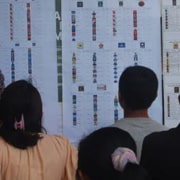
Prof. Wiku Adisasmito as head of the initial Covid-19 Rapid Response Taskforce. Photo by Danung Arifin for BNPB
The Indonesian government’s response to Covid-19 has been ineffective. Public criticism has grown louder in recent months as the dire consequences for health, society and the economy have become increasingly clear.
The government has made a string of problematic policies and statements in its attempts to mitigate the pandemic.
In March, for example, the Ministry of Health unilaterally assigned laboratories for Covid-19 testing without first establishing clear standards and requirements. This meant that operations were severely delayed as labs scrambled to prepare. One lab in Aceh, for example, needed a full month from when it was assigned as a testing facility till it was ready to open its doors.
At the centre of it all, the National Disaster Management Agency (BNPB) has been slow to act and organise a response.
The Covid-19 Rapid Response Taskforce, led by the BNPB, was uncertain and ineffective in its coordinating role at the start of the outbreak. It was replaced in July by the Committee for Handling Covid-19 and National Economic Recovery via a presidential regulation (No. 82 of 2020). The new committee has been provided with greater authority than the taskforce, but it still does not address the root cause of the problem: ineffective governance and an urgent need for structural reform.
It’s a governance problem
Research by SMERU has identified three structural problems behind the government’s messy and ineffective policy and programmatic response to Covid-19.
First, the distribution of authority has been unclear. Even after the Covid-19 outbreak was declared a national disaster, there was no centralised national effort to control the virus’s spread and manage its impacts. Clear distribution of authority is especially important for relations between the central and local governments.
One example of this issue is poor coordination and mishandling of Covid-19 case data. At first, local governments were individually announcing their Covid-19 case numbers. Later, the central government asserted that it should be the only authority giving updates and announcements to the public. The result was widespread confusion.
Second, there have been limited efforts to mobilise and utilise strategic resources. Synchronised use of resources such as databases and government programs have been lacking or entirely absent among government institutions. For example, social assistance programs for people impacted by the pandemic were scattered across difference institutions and levels of government, with no synergised use of social welfare databases. This relates to the first problem, as it is not clear who has authority to lead or coordinate resource use.
Even the BNPB, as the leader of the Covid-19 Taskforce, does not have the authority to synchronise these types of resources. For example, social assistance programs have been criticised for miscoordination and mistargeting of their efforts, partly due to the many different timetables, methods, and forms of assistance found between programs. This has resulted in social jealousy and misunderstanding among communities.
Third, there has been a lack of flexibility in responding to policy problems across regions and levels of governance. In some cases, problems have implicated several administrative regions and the central government at once, as in the case of Greater Jakarta, which includes the municipal areas of Jakarta, Bogor, Depok, Tangerang and Bekasi.
Debates raged in April over train operations across the capital’s greater area, as the central government continued to reject requests from the various city governments to reduce mobility. The central government claimed there was no need to take further action, as large-scale social restrictions (PSBB) had already decreased citizens’ mobility by 80-90%.
So what can be done?
The three structural problems outlined above indicate that fundamental changes to the Indonesian government’s disaster response framework is needed, especially in terms of governance and policy. This will require revisions to the Law on Disaster Management (No. 24 of 2007), which serves as the main framework for the government’s Covid-19 response.
Our research suggests three strategies to revise the law.
First, reference should be made to the Law on Local Government (No. 23/2014). By referring to the local government law, the legal basis of authority and inter-government coordination in the event of a disaster would be much clearer. The law states that when a problem affects more than one province – in this case, a national-level disaster – the central government may take the lead role in coordinating response. In responding to Covid-19, the BNPB should therefore be the lead actor, and should be given the authority to carry out this role.
Second, the BNPB’s authority to coordinate strategic resources must be strengthened. This strategy is relevant and needs to be activated only when a national emergency, such as the pandemic, has been declared. With its authority strengthened under the Disaster Management Law, the BNPB would be better able to synchronise government programs and resources. This would address problems such as those seen in the social assistance program, improving coordination across levels of government.
Third, the BNPB’s authority to design a command system and structure for disaster response must also be strengthened. Greater authority in this respect would enable the BNPB to coordinate issues across administrative regions. For example, this would give the BNPB the authority to establish taskforces involving multiple regional administrations, such as a Greater Jakarta Taskforce to work specifically on synchronising policy implementation in that area.
As the disaster situation posed by the Covid-19 pandemic appears set to continue throughout this year and beyond, it is critical that the central government acts urgently on these matters of structural reform.
While this cannot repair the damage done so far by the mishandling of the situation, it can ensure a smoother road to recovery and preparedness for the years ahead.
This research is supported by the Knowledge Sector Initiative, an Australia-Indonesia partnership.











